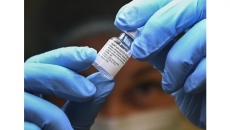Canada's vaccine rollout received a significant boost Friday with the approval of a third COVID-19 inoculation, and Prime Minister Justin Trudeau announced another partnership with an India-based institute that will deliver two million additional doses of the newly authorized jab to Canadians by the spring.
About 500,000 of those doses should be in Canada by the end of March.
Dear Hon’ble PM @JustinTrudeau, I thank you for your warm words towards India and it’s vaccine industry. As we await regulatory approvals from Canada, I assure you, @SerumInstIndia will fly out #COVISHIELD to Canada in less than a month; I’m on it!
— Adar Poonawalla (@adarpoonawalla) February 15, 2021
Trudeau spoke on Friday hours after Health Canada announced it had approved a COVID-19 vaccine from AstraZeneca.
Update: After completing their rigorous and independent review process, @GovCanHealth has approved AstraZeneca’s COVID-19 vaccine - and we’ve already secured millions of doses for people across the country. Canada now has 3 vaccines approved for use in our fight against COVID-19.
— Justin Trudeau (@JustinTrudeau) February 26, 2021
The new partnership also means Canada will receive two million doses of the CoviShield vaccine, which is the same as AstraZeneca's product, through an agreement with Mississauga, Ont.'s Verity Pharmaceuticals and the Serum Institute of India.
Trudeau says the firstshipment of half a million of CoviShield doses will arrive by March.
Health Canada's chief medical adviser Dr. Supriya Sharma said in a briefing Friday that the CoviShield and AstraZeneca products are "for all intents and purposes" the same vaccine.
"While this is good news, we must continue to do our best to follow public health guidelines, "We're all in this together and need to remember to keep wearing a mask, washing our hands and keeping our physical distance." Dr. Sharma said at a news conference Friday.
The difference is in where they are manufactured, she said, using the analogy of the same recipe made in two different kitchens.
The two million doses of CoviShield are in addition to the 20 million doses Canada already secured with AstraZeneca that will start arriving in the spring.
Trudeau said as vaccinations ramp up across the country, many provinces have expanded the number of health professions able to administer a COVID-19 vaccine, and he asked for dentists, midwives, pharmacy technicians and retired nurses to lend a hand in the rollout.
The vaccine can be used immediately on people over 18, guidance in line with authorizations from the United Kingdom, the European Medicine Agency and the World Health Organization, though several other European countries only allow it to be used on people under the age of 65.
Health Canada's authorization says the clinical trial data was limited for people over 65, but that blood tests showed seniors did produce COVID-19 antibodies from the vaccine.
Also "real world evidence and post-market experience" in places the vaccine is already in use show "a potential benefit and no safety concerns" with giving the vaccine to seniors.
Altogether, Canada is set to get around 24 million doses of AstraZeneca between April and September.
The vaccine is administered in two doses, anywhere from four and 12 weeks apart, though some data suggests waiting longer between shots is preferable.
Twenty million doses are being manufactured n the United States.
Another 1.9 million doses are expected through the international vaccine-sharing program known as COVAX, with the first 500,000 of those also potentially arriving before the end of March. Those doses are made in South Korea.
Canada has been criticized for taking doses from COVAX, when it has so many doses coming from private deals with vaccine makers.
AstraZeneca is the most flexible of the vaccines now approved in Canada, able to be shipped and stored in refrigerators, rather than freezers. Open vials can be saved for up to 48 hours in a refrigerator as long as they haven't been out of the fridge for more than six hours total before being used.
Both Pfizer and Moderna are shipped frozen, with the former requiring ultracold storage in special freezers, and both must be used entirely after a vial is opened.
More than 1.7 million doses of Pfizer-BioNTech and Moderna vaccines have been injected in Canada, with about 700,000 people getting one dose so far, and almost 500,000 now fully vaccinated with two doses.
Before AstraZeneca's approval, Canada anticipated receiving another four million doses of Pfizer and Moderna in March, and hoped to vaccinate at least three million people by the end of the month.
Another 11.5 million people are in line to be vaccinated by the end of June, with the remaining Canadians by September. All of that depends on no further production delays.
A timeline for deliveries of the AstraZeneca vaccine doses from the U.S. is not released.
The AstraZeneca vaccine works differently than the other two already in use in Canada.
Both Pfizer-BioNTech and Moderna use messenger RNA technology, using RNA encoded with the piece of the SARS-CoV-2 virus known as the spike protein. The mRNA trains the body to fight off a COVID-19 infection. Both were about 95 per cent effective at preventing COVID-19 in clinical trials and reports in Canada have said even one dose has prevented illness in more than 80 per cent of long-term care residents and health-care workers.
AstraZeneca is a viral vector vaccine, which takes a cold virus, modifies it so it can't reproduce itself, and adds the SARs-CoV-2 spike protein. When injected, it too provokes the body to develop infection-fighting antibodies and cells to fight the virus.
Health Canada says it is about 62 per cent effective, with mostly mild and short-lived side-effects like headaches, fatigue and soreness at the injection site.
AstraZeneca will have to submit safety reports.
Health Canada is also reviewing two other vaccines.
Approval of Johnson and Johnson's vaccine will likely not come until early March and Novavax is not expected until April.





